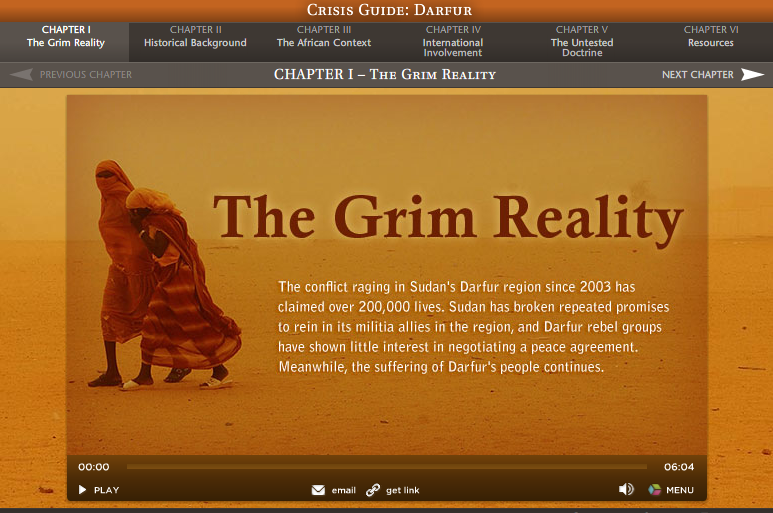CFR.org | Waiting for Pyongyang
/North Korea failed to meet its weekend deadline to shut down its Yongbyon nuclear reactor, although South Korea officials say activities detected near the reactor may indicate Pyongyong intends to close down Yongbyon (AP). U.S. officials said they will give Pyongyang a few more days to meet its end of a tentative denuclearization deal, signed two months ago by Six-Party Talk members. That agreement set an April 14 deadline for North Korea to shut down the main reactor at its facility at Yongbyon. At stake are millions of dollars in energy and humanitarian aid, not to mention progress toward denuclearization and renewed inspections. A dispute over $25 million in frozen North Korean funds in a Macao bank imperils the deal.
CFR.org | A New China Approach
/Washington’s decision to eschew soft diplomacy with China for a more assertive stance on economic relations appeared to threaten U.S.-Chinese relations. On April 9, the United States sued China (NPR) in the World Trade Organization (WTO) court over Beijing’s failure to address intellectual property rights and open its market to American DVDs, books, and movies. China’s Ministry of Commerce responded, saying the U.S. complaints would “seriously damage” (FT) bilateral ties.
CFR.org | Hills: U.S.-Chinese Relations Need “Habits of Cooperation”
/A new CFR Task Force Report on U.S.-Chinese relations recommends an “affirmative agenda of integrating China into the global community” with a view toward involving Beijing in discussions on security, trade, human rights, and China’s growing military power. Carla A. Hills, CFR’s vice chairman and co-chair of the China Task Force, says the report’s recommendations seek to address “political resistance at home that emanates from worries about China’s rapid growth in the last two decades.” Hills, who served as the U.S. trade representative during the administration of George H.W. Bush, says creating “habits of cooperation” will serve as a means for China to adopt “international norms.”
CFR.org | Crafting a U.S. Policy on Asia
/Throughout the 1990s, strategic concerns over long-running conflicts in East Asia—from the division of the Korean peninsula to tensions across the Taiwan Strait to the Indian-Pakistan nuclear competition—shaped U.S. policy in the region. Although the Sino-Soviet rift during the Cold War provided a basis for U.S. relations with communist Beijing, post-Soviet Russia developed a growing military and diplomatic partnership with China, which also began building security and economic agreements with its neighbors in Southeast Asia. Since 9/11, U.S. attentions have turned toward the Middle East and counterterrorism efforts. “One of the major casualties of the war on terror has been a strategic policy toward Asia,” says Donald C. Hellmann, director of the Institute for International Policy at the University of Washington. Meanwhile, China bloomed as a major trading partner and diplomatic power in the region, in some cases displacing the United States economically. India, too, emerged as an economic force, and tensions flared on the Korean peninsula over Pyongyang’s 2006 nuclear test.
CFR.org | U.S. Relations with China (1949 - Present)
/CFR.org | Kripalani: Pakistani Protests May Leave Musharraf's Political Future "Extremely Uncertain"
/
Manjeet Kripalani, CFR press fellow and India bureau chief for BusinessWeek, discusses the increasing social unrest in Pakistan caused by President Pervez Musharraf's decision to suspend Chief Justice Iftikar Chaudhry. She says the crisis could leave the president's political future "extremely uncertain.
CFR.org | Musharraf’s Faltering Grip
/A few weeks after Pakistani President Pervez Musharraf suspended Iftikar Chaudhry, Pakistan’s chief justice, demonstrations boil on around the country. Protesters accuse the president of violating the constitution (al-Jazeera) in order to silence the judge who questioned his authority, though Gen. Musharraf denies (Rediff) the claims, saying “there is a conspiracy against me”. At the same time, the Supreme Court demanded (Reuters) the government provide information about some four hundred people who’ve vanished into police custody since Pakistan allied itself with the United States in 2001. CFR Fellow Manjeet Kripalani discusses Pakistan’s domestic unrest in this new podcast.
CFR.org | China’s Political Safety Valve
/Social protests in China no longer startle. Hundreds and even thousands regularly gather to rail against local corruption, land expropriation, environmental degradation, or unpaid wages, often prompting harsh police crackdowns. In recent days, police teargassed protesters (Radio Australia) when the crowd blocked train lines in eastern China to protest redistricting they fear may threaten their social benefits. The unrest has not escaped Communist Party notice: An official newspaper advised local authorities to restrain (AP) from using force in protests that serve as a “collective appeal for help from violations of the law.” CFR Fellow Carl Minzner says in a new podcast that China lacks institutional means to address grievances at the local level, so protesters mount large-scale demonstrations to petition the central government for assistance.
CFR.org | Stalled Again at Six-Party Talks
/Even as a path is cleared to meet the requirements of the North Korean denuclearization agreement reached in February, another round of Six-Party Talks has stalled. The February deal, which requires Pyongyang to shut down its main nuclear reactor within sixty days in exchange for fuel oil, involves a series of bilateral talks, including U.S.-North Korea negotiations aimed at normalizing relations. On March 14, Washington broke through on one of the biggest obstacles in its relations with Pyongyang with a decision that allows the release of $25 million (LAT) in North Korean funds from a Macao-based bank.
CFR.org | Backgrounder: Olympic Pressure on China
/As the Beijing Olympics draw near, the world is bracing for what promises to be a historic event. China has promoted the games as an international coming-out party under the slogan, "One World, One Dream." Even the opening date is auspicious: August 8, 2008—8-8-08—is a very lucky day in Chinese numerology. Since Beijing won its bid to host the games, however, critics have attacked China's record on issues ranging from human rights to food safety to the environment. Just before the Olympic torch relay, China cracked down on Tibetans protesting the subjugation of their culture. The repression and violence that ensued brought international condemnation and calls for Olympic boycotts. China's environmental degradation, restrictions on free speech, and continued investments in Sudan, Myanmar, and Zimbabwe have drawn criticism as well. In its campaign to win the right to host the Olympics, China pledged to the International Olympic Committee (IOC) that the games would remain "open in every aspect." Many believe China is failing to abide by that pledge, but the vehemence of anti-China sentiment abroad has spurred a nationalist backlash within China, and the Chinese government strongly condemns what it considers the politicization of the Olympic Games.
Co-authored by Preeti Bhattacharjee and Carin Zissis
CFR.org | Minzner: "Institutional Failure" Leads to Social Unrest in China
/
CFR International Affairs Fellow Carl Minzner, an expert on Chinese domestic issues and former senior counsel at the Congressional-Executive Commission on China, discusses the increase in social unrest in China. He says that in China, a country under one party rule lacking institutional means to address grievances at the local level, "central leaders don't necessarily know what's going on until ten thousand local farmers make it out of a particular area and mount a collective protest."
CFR.org | Judgment Time for Musharraf
/Pakistani President Pervez Musharraf's decision to suspend the country's chief justice poses a potential crisis for a leader torn between domestic and international pressures. Musharraf indefinitely removed Iftikhar Muhammad Chaudhry (IHT) from office for abuse of power, but opponents claim the move was aimed at silencing an outspoken judge before a series of election-year cases challenging the president's authority. Appointed by Musharraf in 2005, Chaudhry increasingly strayed from the government line in human rights cases. Hundreds of lawyers protested Chaudhry’s suspension in front of Islamabad's Supreme Court over what they say is an unconstitutional suspension, and several judges have resigned (BBC). In an unlikely alliance, members of Pakistan's conservative Islamist coalition joined the secular opposition in demonstrations, leading to the arrest of the coalition's leader. As protests broke out (Times of London) in other cities, Musharraf's presidential predecessor Rafiq Tarar was arrested at a Lahore rally.
CFR.org | The Burden of Saying Sorry
/Japanese Premier Shinzo Abe drew international reproach recently for disputing that his country's military coerced young women into sexual enslavement during Japan's occupation of China and the Korean peninsula. The controversy also raised questions about the importance of saying sorry, a gesture that can smooth diplomatic waters but can also open the door to claims for legal compensation. Abe's remarks came shortly after U.S. Rep. Michael M. Honda (D-CA) proposed a bill in January demanding that Tokyo apologize and accept “historical responsibility” for the Japanese military's role in the abuse of “comfort women.” That is the term for the roughly 200,000 mostly Korean and Chinese women pressed into providing sex to Japanese soldiers during wartime.
CFR.org | About Face on North Korea
/As the United States hosted North Korea for talks about normalizing a tempestuous relationship, questions swirled around Washington’s suddenly softer approach to Pyongyang. After years of refusing bilateral talks with the Hermit Kingdom—one of the three members of the “Axis of Evil”—the Bush administration switched tactics. Christopher Hill, the State Department’s senior diplomat for East Asian affairs, sat down in New York this week for direct negotiations with Kim Kye-Gwan to hammer out next steps on an agreement reached during February Six-Party Talks. Under the pact, North Korea will receive fuel oil, economic assistance, and humanitarian aid in return for shutting down and sealing its nuclear facilities within sixty days.
CFR.org | Taiwan's Turbulent Straits
/Taiwan and China have engaged in a new round of verbal sparring aggravated by Beijing's announcement of increased defense spending and Taipei's latest call for independence. China said it would increase military spending (LAT) by 18 percent, lifting its defense budget to $45 billion. The announcement came less than two months after a controversial anti-satellite test and coincided with a visit by U.S. Deputy Secretary of State John Negroponte, who called for greater transparency in China's military spending. Beijing, in turn, raised opposition to Washington's plans to sell some $400 million in weapons to Taiwan. Negroponte countered that the weapons “would be for strictly defensive purposes” (IHT). But the proposed arms deal comes as Taiwan reveals it conducted a February test of a cruise missile capable of hitting mainland China (Stratfor).
CFR.org | India’s Internal Terror Troubles
/While Kashmir and al-Qaeda-linked terrorism garner front-page play around the world, India's own internal terrorism problem tends to be off the radar of most American news outlets—or, at best, warranting a postage-stamp-sized wire story (NYT) buried at the bottom of an inside page. Yet terrorism-related deaths in the contested territory of Jammu and Kashmir dropped threefold since 2002, according to the South Asia Terrorism Portal report. Violence related to Maoist extremism in India, however, defies New Delhi’s counterterrorism efforts. In April 2006, Prime Minister Manmohan Singh called the leftist insurgency “the single biggest internal security challenge ever faced by our country.” A new Backgrounder on terrorism in India explores the Maoist insurgency.
CFR.org | Pakistan’s Uneven Push for Women
/The women’s rights movement in Pakistan suffered a blow (Australian) when a religious extremist recently shot and killed cabinet minister Zilla Huma Usman as she prepared to address a public meeting without a veil covering her face. A prominent rights activist, Usman had previously drawn the ire of conservative Muslims when she helped organize a mixed-gender marathon. Her assassination came within days of Pakistan’s Women’s Rights Day, as well as the proposal of the new Prevention of Anti-Women Practices Bill, which outlaws forced marriages (Daily Times) and strengthens women's right to inheritance.
CFR.org | Cheney Presses Pakistan
/Vice President Dick Cheney made a surprise stop in Islamabad to deliver a stern warning (NYT) to President Pervez Musharraf that Washington may reduce aid to Islamabad if he does not take a more offensive approach toward terrorists that have allegedly sought refuge close to the Afghan border. President Bush’s new budget includes $300 million in military aid to Pakistan to support counterterrorism activities and stop cross border raids into Afghanistan. The U.S. Congress has threatened to cut the military funding (CSMonitor) if Islamabad does not take a more aggressive approach toward controlling militants within Pakistan. The new pressure marks a change in tone from just last year, when Bush referred to Musharraf as “my buddy.” After Cheney’s brief visit, Pakistan’s foreign office responded pointedly, saying Islamabad does not take orders (The News) on how it handles counterterrorism efforts.
CFR.org | The Final Frontier for Weapons
/China’s decision in January to blast one of its own aging weather satellites out of orbit using a ballistic missile drew global criticism. The explosion left large amounts of dangerous debris in orbit (Defense News) that could damage any of more than three hundred other satellites in orbit, and raised doubts over China’s claims that it plans a “peaceful rise” (Times of London). But the chief concern was that the blast could lead to a space arms race.


